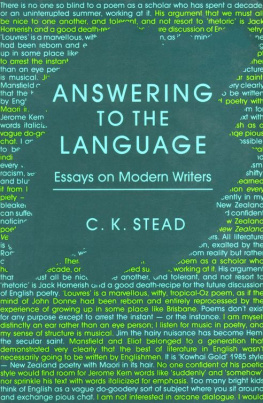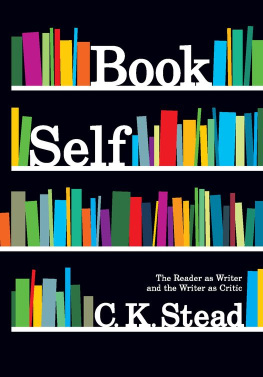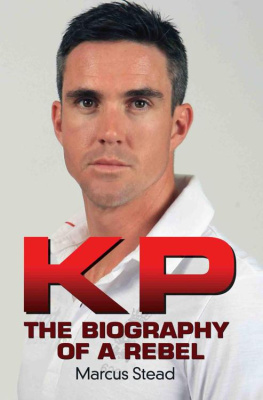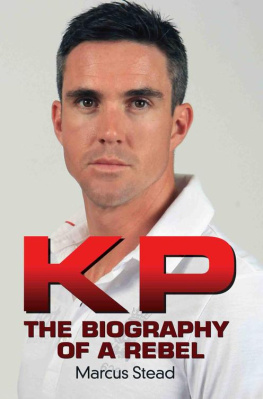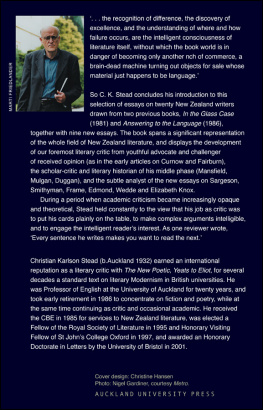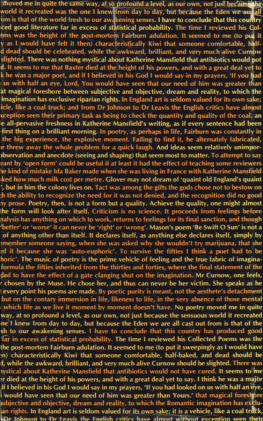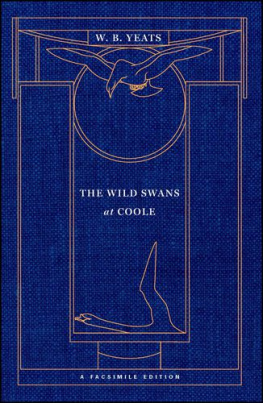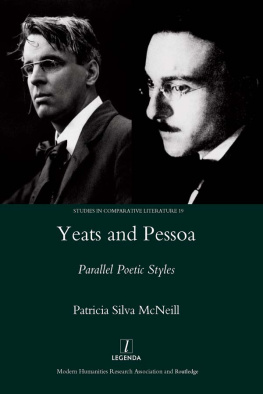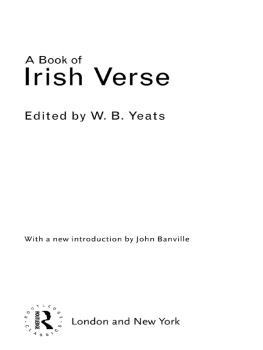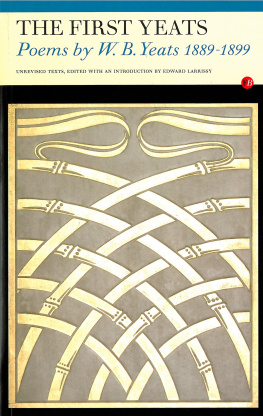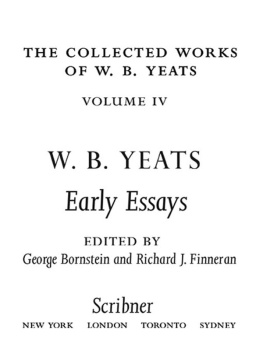C.K.S.
In August 1986, I went as one of the lecturers to the Yeats Summer School in Sligo, Ireland. Every morning at breakfast in the Silver Swan Hotel I sat looking down at the shallow fast-flowing river that rushes over rocks, between stone walls, under stone bridges, from Lake Innisfree through Sligo town and on past the quays to the Atlantic. More than twenty years after publishing a chapter in TheNewPoetic on Yeats I was in the Yeats countryside for the first time. On a hot Sunday I set out to walk from Sligo to the Yeats grave in Drumcliff Churchyard. It might have been four miles each way Im not sure, but it seemed a long walk in the heat. Just before reaching the churchyard I found a little isolated store where I bought a can of cold drink and a small bar of chocolate.
The grave as I recall it was not far from the church door. There was a line of tall trees, beyond which, across fields, you could see Ben Bulben.
Under bare Ben Bulbens head
In Drumcliff Churchyard Yeats is laid.
Standing there I had a moment of intense well-being which at first I mistook for something literary. Then I recognized it as my bodys grateful response to chocolate and chilled lemonade. I thought how differently I would have felt if, as a young and ardent admirer, I had stood there; and I remembered the feelings I had had in the 1950s standing looking at the bare white cross on a Welsh hillside which at that time was all that marked the grave of Dylan Thomas.
There is loss in this change this aging; but Im sure there is gain as well. Once the power of Yeatss poetry was its own justification, and it evoked a corresponding reverence. Now, incantation is not enough. In some of the essays in this collection I make demands of the poems that might have seemed needless or impertinent twenty-five years ago. To some readers they will seem needless or impertinent now. I dont think there is a way of determining that the critic then or the critic now is right. Though they are the same person, and in agreement that Yeats is a great poet, they are also two different critics making different demands. Criticism is never right or wrong but only more or less persuasive. We dont say Dr Johnson is one of the major critics in English because we consider him to be right (any fool can be that), but because he articulated one possible critical point of view in a way that makes us understand it and feel the presence of the man who held to it. Academic criticism often fails because it does not carry with it in fact works to exclude the personality of the critic. Who is responsible for these bodiless opinions? Even if we agree we may be bored.
So the man who wrote the essays, lectures, and reviews collected here is and is not the critic who wrote a many-times-reprinted piece on Easter 1916. He is prepared, even in his fifties, to walk miles to visit the grave of a great poet. But when he looks down on that epitaph carved at the poets command,
Cast a cold eye
On life, on death.
Horseman, pass by!
he thinks, enjoying his lemonade, What horseman? Why did Yeats not write Motorist, pass by!? Because, of course, such an injection of reality would have interfered with the rhetoric of the occasion. Yeats was the kind of poet who could not leave even his obsequies to others.
But circumstances intervened. Yeats died in 1939, not in Ireland but in Roquebrune on the French Mediterranean coast. Less than a year after my Drumcliff visit I was standing at his other grave or rather, before the stone in Roquebrune cemetery commemorating his first interment, which lasted six years until the ending of the Second World War made it possible for his bones to be brought home on an Irish warship and his instructions for burial carried out to the letter. With me were his son and daughter, now in their sixties, and two dozen of the most eminent authorities on his life and work. We had been invited by the Princess Grace Memorial Library in Monte Carlo to hold a seminar on his poetry; and on a Sunday at the end of it we made our visit. Somewhere in everyones mind there must have been the widely discussed story that a mistake was made at the time of the disinterment, and that it was not the coffin of Yeats that was removed from Roquebrune to Drumcliff. In fact our seminar had received assurances from the local mayor that his records convinced him no such mistake could have been made.
However well-or ill-grounded, the story, like many such, is unprovable and unkillable. Yeats, possessor of a wicked Irish sense of humour, would have enjoyed it (and I once heard that his brother Jack, the painter, was its source); but it seems to me it mocks the deliberateness, the artifice, the solemnity, of Yeatss own well-laid plans for his burial, and of that epitaph with its Horseman, pass by!
While we stood there enjoying the wonderful views of steep rocky slopes, headlands, and blue bays, I was aware also of two lines of big black undertaker ants marching in and out of a crack in one of the tombs which, because of the steep terrain, are cemented above ground. Whether the bones shipped home were those of Yeats or another, they must certainly have been stripped clean long before Ireland received them bones suitable for emblematic purposes; and that, perhaps, is appropriate. Yeats is the poet who cries out Another emblem there! as a swan flies over. The priority of symbol over fact in much of his work may be the aspect with which I find myself most at odds. I am the first to acknowledge the complexity of what we call reality; but at heart I am, for all the difficulties such a position involves, a realist before all else. With a sort of Johnsonian literalness I feel that Horseman, pass by! is a suitable injunction only in a time and place where there are horsemen. To refuse the reality, or ignore it, seems to me as much an impropriety as these reflections of mine upon the bones of the poet will seem to those who think the presence or absence of actual horsemen a mere detail and not worth quibbling over.
After the visit to Roquebrune cemetery we descended by bus to visit the ruins of the Htel Idal Sjour where Yeats died. Work had begun on converting it I think to modern apartments. But the shell remained as it must have been in the 1930s; and we walked about in the garden at the back where Anne and Michael Yeats had played as children. Michael (now a Senator of Ireland and I think a Member of the European Parliament) pointed out which trees had grown up, what buildings were new, and how the view down to the bay had changed. And here I began to experience the feelings I might have expected to feel on that walk to Drumcliff. The old hotel seemed like a stage-set for one of Yeatss last plays. I felt the ghostly presence of the old poet, dying there, attended by his wife, and the ghosts of the two children, subjects of poems which seem to bear no relation to their living presences, who on earlier, happier visits had played in this Mediterranean garden. My imagination was engaged, not by the full Yeatsian rhetoric, but by the human drama. But would the reality have so moved me if I had not first been stirred by the rhetoric?

